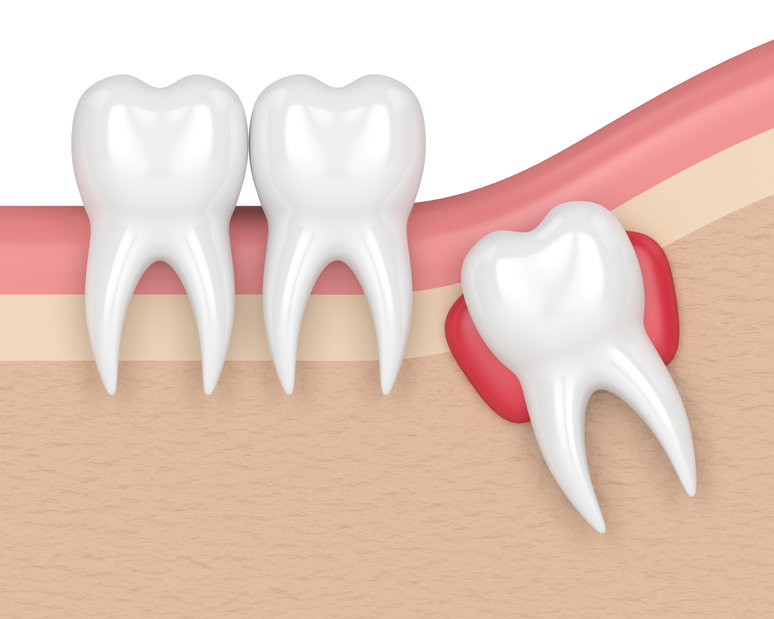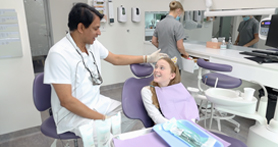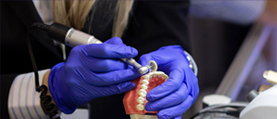Many of us have grown up with jokes around wisdom teeth. We have heard things like with wisdom teeth you will get some wisdom making you a real adult. As we all know, wisdom teeth do not make us any smarter or bring wisdom. They are called wisdom teeth because they erupt after you have entered adulthood, between the ages of 17 to 21 years or your wisdom years. These teeth are right at the end of your teeth, at back. You get one wisdom tooth each at the end of both sides, upper and lower, 4 in all, which will make a complete set of 32 teeth in the mouth.
Wisdom teeth fall in the category of molars, the very tough and very wide teeth, that grow during the life span of human development, designed for eating raw meats, roots and vegetables. But as evolution took place, they may not be crucial for chewing purposes and as the time passed, they have become obsolete. Today, due to advances in dental care and hygiene, they may not be very purposeful since our molars are enough to care of our needs for chewing, and they may hinder the working of other teeth in the mouth. They may not appear at all in some adults, which is explained as our changed jawlines in people due to changes in diet.
Wisdom teeth are the ones which have maximum numbers of issues when they erupt and even after they have come through. Millions of wisdom teeth are extracted every year all over the world. The main cause being lesser space available on the gum for them to be accommodated.
When do dentists see no need to pull out wisdom teeth?
Most people who need to get wisdom teeth extracted fall between ages 16 to 25. Very few people after 30 face issues with wisdom teeth unless they are related to problems other than growth of wisdom teeth. Many dentists advise removal of wisdom teeth because of the potential problems they can create after they have erupted, including, cyst around the tooth, damage to nearby teeth and roots and bacterial growth due to unreachability for cleanliness. But not all dentists agree to taking out teeth which are healthy and do not cause any problems, or seem to be able to cause problems in near future. The see no need to pull out wisdom teeth if they are:
Fully erupted, and healthy, and are well positioned, have a correct bite with the opposite set of teeth, (upper or lower), and when you are able to reach them for brushing and flossing.
When is the need to get your wisdom teeth get extracted?
There are many reasons when you have to decide to get the wisdom teeth extracted with the consultation of your dentist of course. Since the wisdom teeth are wider than other molars, they require more space to emerge from the gums and also to settle on the available space along with other molars. Many wisdom teeth grow and come out partially, or grow horizontally under the jawline and emerge sideways on the gums.
There are signs that will indicate to you the need to get the wisdom teeth extracted, which include the following.
Discomfort at the back of your mouth
The first signal you get for the trouble with your wisdom tooth is the pain or sensitivity right at the back of your mouth which you will not be able to pinpoint at the exact location, but will eventually understand to be in the wisdom tooth. It may start to pain even while you are not doing anything. It may pain while eating or brushing and cleaning your teeth and progress to throbbing sensation. This is a clear indication to see your dentist about this and get it checked.
Painful jaws
When the wisdom teeth that are growing sideways, start pushing other teeth in the line, your jaws will start paining. This pain sometimes grows into agonised movement of your mouth. Opening your mouth brings on hurt. The soreness of mouth is a clear indication to see your dentist about the wisdom teeth extraction.
Swollen tissues around the wisdom tooth
Many people experience inflammation and redness in the gums around the wisdom tooth while it is erupting. It may pain while brushing, and the whole area feels sore.
Development of cysts in the mouth
After a while, when problems with the teeth are not solved, it allows cysts to grow in the mouth (which are fluid filled bags). Cysts can impact the roots of neighbouring teeth resulting in severe pain.
Sinus issues
Sinuses are empty spaces located near the nose and below the eyes which get affected by the problems in the upper jaw. When jaws are inflamed, the sinuses get cramped and may result in congestion, pressure or pain in the sinuses. Pain above the jaws and even next to the nose area is a sign of trouble in the teeth.
Mis alignment in the molars
When you find the neighbouring teeth getting shifted which will be painful, you will need to get the wisdom tooth extracted because it will push the teeth out of alignment which will create further damage.
Bad breadth
When the wisdom tooth is growing in any way that is different from normal, it will be difficult to clean the impacted area because of the pain or because you cannot reach there. This will lead to plaque. When plaque is not cleaned, it will end in growth of sulphur producing bacteria which gives a bad odour to your breadth, and a bad taste in your mouth.
Decay in the teeth and gums
Once there is bacteria in the mouth, it will result in creating cavities in the adjacent teeth. Bacteria may enter the pockets which have been created by the cysts or by improperly placed wisdom tooth. These pockets will allow bacterial growth and end up in making the gums diseased.




